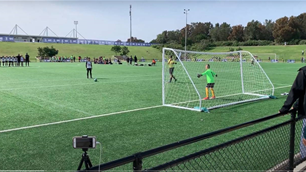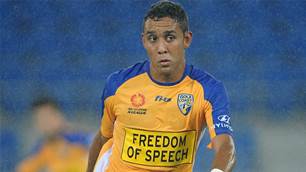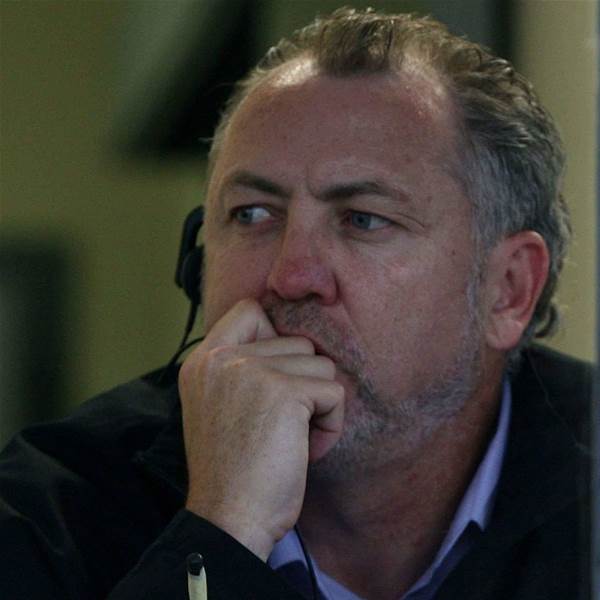ANALYSIS: Perth Glory's players may not have produced too many positive performances or results, but the club’s co-owners have managed to do both.
In announcing that Dave Mitchell had re-signed for a further two seasons, Tony Sage and Brett McKeon delivered exactly what the club needs if it is recapture its status as a powerhouse of the Australian game. Stability.
Some observers may raise an eyebrow or two at the coach of a club running second-last and boasting only three wins all season being rewarded with a contract extension, but a look at the bigger picture indicates clearly that such a move is very much in the club’s long-term interests.
With Mitchell’s existing deal due to run out at the end of the season, Sage and McKeon were left with a straight choice between backing him or sacking him.
The latter option appeared a real possibility following the back-to-back drubbings at the hands of Central Coast and Melbourne, but such a decision would surely have served only to further delay the club’s bid to shake off its tag as an A-League also-ran.
A new coach would have simply used the rest of the campaign to assess the existing playing staff, then used the off-season to build his own squad. That is of course essentially what Dave Mitchell did after succeeding Ron Smith two-thirds of the way through last season and thus far, results have shown only a marginal improvement.
Rather than revealing flaws in Mitchell’s managerial capabilities, however, perhaps this simply indicates that transforming the perennial A-League strugglers into serious top-four contenders is a far greater challenge than is generally appreciated.
It is often overlooked that A-League managers have significantly less room for manoeuvre than their counterparts overseas, rendering radical overhauls effectively impossible.
Even if he had been handed an open cheque book by Sage and McKeon, the salary cap, squad size limit and foreign player restriction would have prevented Mitchell from drafting in a clutch of top quality new recruits.
Those same regulations also prevented him from culling some of the deadwood from his existing squad. As it stands, Mitchell’s off-season foreign signings have generally fared well, with Amaral and Eugene Dadi among the better performers so far this season and Adrian Trinidad showing glimpses of potential.
Paul Reid would also have been a very useful recruit, but his decision to snub Glory in favour of Adelaide reveals the existence of another recruitment factor beyond Mitchell’s control, namely Glory’s poor A-League track record.
With Aurelio Vidmar able to offer Asian Champions League football and the serious prospect of domestic success and most pundits tipping Perth for the wooden spoon, it was perhaps unsurprising that the former Brighton midfielder opted for Hindmarsh rather than Members Equity.
Sacking Mitchell would therefore have set the club back another year in terms of the restructuring of the squad and his replacement in the Members Equity hot-seat would have found himself subject to exactly the same limitations imposed upon his predecessor. He would also have found the player market-place significantly more competitive with the advent of the two new A-League franchises.
In sharp contrast, the board’s decision to publicly reaffirm their long-term faith in Mitchell has yielded instant results. Tando Velaphi has already made it clear that he is keen to begin new contract negotiations now that the managerial situation has been resolved and although Adriano Pellegrino agreed new terms before Friday’s official announcement, it seems unlikely that he was not made aware that Mitchell would be staying before putting pen to paper himself.
Glory’s coach, now unfettered by doubt and uncertainty, can finally begin to work in earnest on the vision that he has for the club’s future.
He can confidently sound out his impressive network of global contacts in regard to overseas recruits for next season and deal with his existing player group from a position of strength and security.
For some members of that group, the board’s decision to retain Mitchell will encourage them to pledge their own futures to the club, while for others, it will seal their exit come the end of the current campaign. But at least the uncertainty is over.
Mitchell may not initially appear the type of manager to issue a “back me or sack me” ultimatum to the board and he might not have done any such thing, but there is no doubt that plenty of steel lurks beneath his affable and laid-back exterior.
Whoever or whatever prompted the board to act, however, is largely immaterial. Decisive action was needed and it was taken.
Now it’s up to Mitch.
Some observers may raise an eyebrow or two at the coach of a club running second-last and boasting only three wins all season being rewarded with a contract extension, but a look at the bigger picture indicates clearly that such a move is very much in the club’s long-term interests.
With Mitchell’s existing deal due to run out at the end of the season, Sage and McKeon were left with a straight choice between backing him or sacking him.
The latter option appeared a real possibility following the back-to-back drubbings at the hands of Central Coast and Melbourne, but such a decision would surely have served only to further delay the club’s bid to shake off its tag as an A-League also-ran.
A new coach would have simply used the rest of the campaign to assess the existing playing staff, then used the off-season to build his own squad. That is of course essentially what Dave Mitchell did after succeeding Ron Smith two-thirds of the way through last season and thus far, results have shown only a marginal improvement.
Rather than revealing flaws in Mitchell’s managerial capabilities, however, perhaps this simply indicates that transforming the perennial A-League strugglers into serious top-four contenders is a far greater challenge than is generally appreciated.
It is often overlooked that A-League managers have significantly less room for manoeuvre than their counterparts overseas, rendering radical overhauls effectively impossible.
Even if he had been handed an open cheque book by Sage and McKeon, the salary cap, squad size limit and foreign player restriction would have prevented Mitchell from drafting in a clutch of top quality new recruits.
Those same regulations also prevented him from culling some of the deadwood from his existing squad. As it stands, Mitchell’s off-season foreign signings have generally fared well, with Amaral and Eugene Dadi among the better performers so far this season and Adrian Trinidad showing glimpses of potential.
Paul Reid would also have been a very useful recruit, but his decision to snub Glory in favour of Adelaide reveals the existence of another recruitment factor beyond Mitchell’s control, namely Glory’s poor A-League track record.
With Aurelio Vidmar able to offer Asian Champions League football and the serious prospect of domestic success and most pundits tipping Perth for the wooden spoon, it was perhaps unsurprising that the former Brighton midfielder opted for Hindmarsh rather than Members Equity.
Sacking Mitchell would therefore have set the club back another year in terms of the restructuring of the squad and his replacement in the Members Equity hot-seat would have found himself subject to exactly the same limitations imposed upon his predecessor. He would also have found the player market-place significantly more competitive with the advent of the two new A-League franchises.
In sharp contrast, the board’s decision to publicly reaffirm their long-term faith in Mitchell has yielded instant results. Tando Velaphi has already made it clear that he is keen to begin new contract negotiations now that the managerial situation has been resolved and although Adriano Pellegrino agreed new terms before Friday’s official announcement, it seems unlikely that he was not made aware that Mitchell would be staying before putting pen to paper himself.
Glory’s coach, now unfettered by doubt and uncertainty, can finally begin to work in earnest on the vision that he has for the club’s future.
He can confidently sound out his impressive network of global contacts in regard to overseas recruits for next season and deal with his existing player group from a position of strength and security.
For some members of that group, the board’s decision to retain Mitchell will encourage them to pledge their own futures to the club, while for others, it will seal their exit come the end of the current campaign. But at least the uncertainty is over.
Mitchell may not initially appear the type of manager to issue a “back me or sack me” ultimatum to the board and he might not have done any such thing, but there is no doubt that plenty of steel lurks beneath his affable and laid-back exterior.
Whoever or whatever prompted the board to act, however, is largely immaterial. Decisive action was needed and it was taken.
Now it’s up to Mitch.
Related Articles

Fresh talent flock to ambitious A-League outfit's pro pathway

Why A-League 20/21 is crucial for Olyroos’ medal hopes













